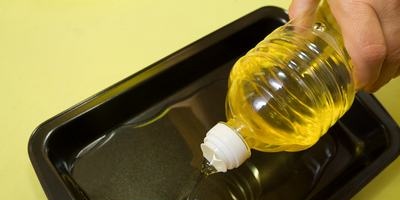|
 The human body, both throughout the year, and especially in spring, urgently needs unsaturated fatty acids - linoleic and linolenic, contained in sunflower and corn oil. These oils are a valuable source of the energy we need, there are about 900 kilocalories in every 100 g. The human body, both throughout the year, and especially in spring, urgently needs unsaturated fatty acids - linoleic and linolenic, contained in sunflower and corn oil. These oils are a valuable source of the energy we need, there are about 900 kilocalories in every 100 g.
With a high content of polyunsaturated acids, from 50% to 75%, monounsaturated acids from 14% to 35%, the presence of proteins and carbohydrates, vitamin E, this type of vegetable oil is simply irreplaceable. It is unnecessary to talk about the popularity of sunflower oil.
They produce both deodorized and non-deodorized oil. Both types are refined to ensure transparency.
Some people mistakenly believe that natural oil, with a smell and taste, is more suitable for salads. Nutritionists recommend using refined oils for this purpose. They ferment faster in the stomach, and lettuce vegetables can be digested and absorbed by the body within a few hours. The secretion of bile on unrefined oil is much greater, and people with high acidity do not need to abuse it. It is better to make salad dressing from light raw vegetables or boiled vegetables from curdled milk, kefir, or whey and cream, taking them in very small quantities. You can also use fresh egg yolk by whisking it with whey.
Frying vegetables can be done in natural, as it is commonly called, vegetable oil, meaning untreated by refining and deodorization. To save money, after frying, the oil is poured into the first dish, without worrying about whether it is good for the stomach. It is preferable not to do this, although a rather large volume broth will significantly reduce the effect that the overcooked oil has on the absorption of food, slowing it down. It is strictly forbidden, even for healthy people who do not have complaints about the work of the stomach and intestines, to use the overcooked vegetable oil left after frying fish for food.
 Natural sunflower oil tastes like fresh toasted sunflower seeds and has practically no sediment. When buying oil for future use, experienced housewives put a tablespoon of table salt on the bottom of the bottle with oil, fearing the bitter taste that occurs over time. There is another way to preserve the natural taste and smell of oil: for this purpose, use beans, soaked for 24 hours, and blanched for 10 minutes in boiling water, and then cooled in cold water. It is also placed on the bottom of a container with oil, a small amount, up to three tablespoons. Natural sunflower oil tastes like fresh toasted sunflower seeds and has practically no sediment. When buying oil for future use, experienced housewives put a tablespoon of table salt on the bottom of the bottle with oil, fearing the bitter taste that occurs over time. There is another way to preserve the natural taste and smell of oil: for this purpose, use beans, soaked for 24 hours, and blanched for 10 minutes in boiling water, and then cooled in cold water. It is also placed on the bottom of a container with oil, a small amount, up to three tablespoons.
These precautions are in vain with corn oil if it is natural and has not passed cold refining frostbite, and deodorization.
Corn oil has its own specific taste and smell, and not everyone likes them. Therefore, refined corn oil is recommended for people with digestive problems. This oil inhibits the fermentation processes in the intestines, helps to relax the tone of the gallbladder. The blood is also purified by long-term consumption of corn oil, and cholesterol levels are reduced.
As containing vitamins of group B, B1, B2, B3, provitamin A, corn oil is consistently popular and is included in children's diet, as it normalizes metabolism.
Karlova A. S.
|